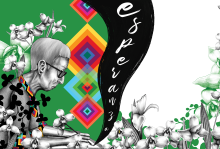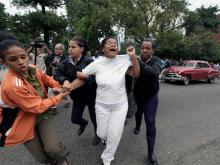peace activist

I MET JULIA ESQUIVEL for the first time in Mexico City, on a rainy afternoon more than 30 years ago, after my 2-year-old son, Abraham, and I crossed the exasperating metropolis by bus and clanky train. Flustered and dripping, I knocked on the door of her tidy home. Esquivel lived in exile, far from her beloved homeland, Guatemala. Henchmen in the service of Guatemala’s military rulers had pursued her relentlessly until at last she fled. I, a young, earnest Canadian, was traveling the northern continent, from Montreal to Costa Rica, preparing to write a book, recording the voices of women—such as Esquivel—scattered in this Guatemalan diaspora.
Esquivel was slender and small, silver hair framing her delicate, elegant face. She ushered us into her house, where we sat on cushions on the floor, drank hot tea, and read stories about St. Francis and a very bad wolf. We talked while Abraham toddled around, and we prayed. That was Esquivel: determined to pray through hurricanes, from the unimaginably large to the very small.
Our friendship spanned the decades. She was to become one of my greatest teachers. Because of Esquivel, who passed away last July, I—raised in a radically atheist household—am now a Christian. Esquivel first cracked open faith for me, showing my young rebellious self that the strongest power for transformation, for individuals as well as nations, came from a place of stubborn grace, a grace, like hers, that never surrendered.
The way a country treats its children
JULIA ESQUIVEL WAS born in 1930, in the western highlands of Guatemala, to a middle-class, progressive family. She was a surprise daughter to an older couple who had been told they would never have children. She grew up treasured. At 7, she said, she found herself before an image of Jesus on the cross; her heart broke with compassion for his suffering.
In 1947, Esquivel became a teacher, and several years later she traveled to Costa Rica to study theology. For a while, she tried on the idea of becoming a minister—first in the Presbyterian Church. She quickly found that the church refused to ordain women. From that time forward, she considered herself a Christian without a particular denomination; she called every imperfect church her home. She worshipped with Mennonites, Episcopalians, and Catholics.
Like people in any family, she quarreled with her siblings: other church members and, particularly, leaders. Young and filled with passion, she actually expected the widows and orphans to be cared for and the poor to be attended to with compassion. She believed this concrete truth: Jesus Christ made room for everyone at the table, starting with those who had been rejected by the world. Time and time again, she clashed with polite church institutions that did not embody what she believed were gospel values: inclusion, justice, the sharing of goods and gifts. Early in her young adulthood, Esquivel decided she would never marry, saying that even a good marriage would have stifled her.

Pwint Phyu Latt is a Muslim peace activist in Burma who sought to promote interfaith relations with Buddhists, the nation’s religious majority. She was sentenced this year to two years in prison and two more years of hard labor.
Gulmira Imin is a Uighur Muslim in China who led the 2009 Uighur protests against its communist government. She has been in prison ever since.

Editor's Note: This piece originally appeared at ABPNews/Herald HERE.
My friend Glen Stassen died today (Saturday, April 26) in Pasadena. He was 78. But because he was born on Leap Day — February 29, 1936 — Glen liked to joke that he was only 19. Until an aggressive cancer took his vitality over the last year, and finally his life, Glen as 78-going-on-19 was totally believable. It is impossible to believe that he has gone to be with Jesus.
There are only a small number of people beyond family who deeply affect the course of one’s life. Glen Stassen was one such person for me, perhaps the primary person outside my family who shaped who I am and what I have become. Having him gone makes me feel like an orphan.

According to the Stockholm International Peace Research Institute (SIPRI), the United States currently spends more than $711 billion per year on military expenditures, which is – by far – the most of any country in the world.
In fact, if one were to combine the totals of the next fourteen nations on the list (China, Russia, the United Kingdom, France, Japan, Saudi Arabia, India, Germany, Brazil, India, South Korea, Australia, Canada, and Turkey), their combined amount is similar to the USA. All together, the USA provides about 43 percent of worldwide military costs, and in addition, the USA per capita ($2,240) and percent of Gross Domestic Product (4.8 percent) in relation to military funding is far greater than any other nation in the world.
With these statistics in mind, one is provoked to ponder some important questions. For example, what is revealed to us about the USA – and our world in general – when military expenses constitute such a significant percentage of a government budget?
In specifics, why does the USA spend far more on its military than any other country? In addition, what is revealed to us about the condition of our global village when $1.73 trillion is allocated each year to military funding? As stated by Sojourners CEO Jim Wallis, “A budget is a moral document. It clearly demonstrates the priorities of a family, a church, an organization, or a government. A budget shows what we most care about.”